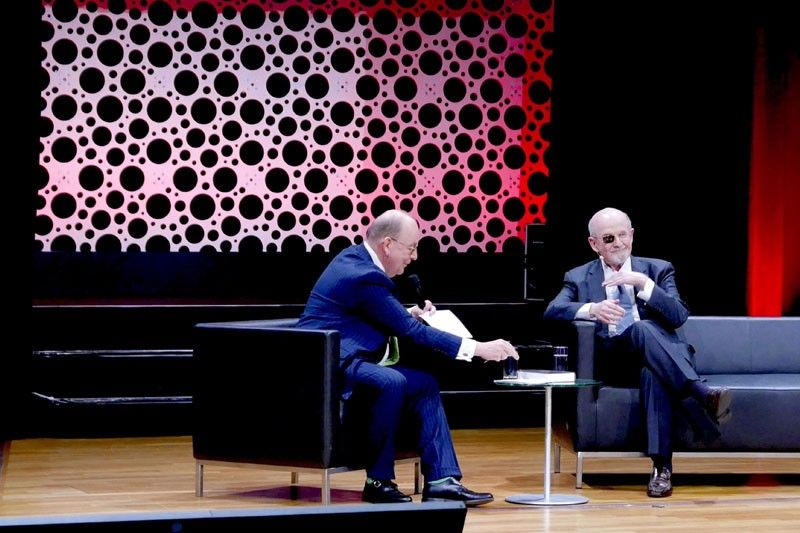Salman Rushdie at 75th Frankfurt Buchmesse: ‘It’s even more important to create beauty in a time of ugliness’

‘Human life being what it is, there are moments when we reveal our best self and we can be principled and noble and likable. And there are other moments when the opposite is true.’
After a trifecta of snaking lines, bag checks, and a merry-go-round of entrances, we were finally able to take our seats at the Congress Center in Messe Frankfurt for the recent Literaturgala where Salman Rushdie was scheduled to speak.
The tight security was warranted. Rushdie’s The Satanic Verses led to Ayatollah Khomeini issuing a fatwa in 1989 calling for the Indian-born British-American author’s death. In August last year, Rushdie was stabbed multiple times as he was about to give a public lecture at the Chautauqua Institute in New York. He lost sight in one eye and the use of one hand. Words fail to describe seeing one of the most hunted and persecuted writers in recent history being showered with adoration by an audience of book lovers.
The event moderator asked the author, “Today, receiving a Peace Prize in times of war and atrocities in Israel and the Ukraine must appeal to your sense of humor. What is in your mind reflecting on this award right now?”
Rushdie answered, “It’s not very funny. I think it’s a kind of Kafka comedy, very dark.”
“So, what is the function of literature in a time of war?” the moderator pressed on.
Rushdie said that the function of literature is more or less the same at any time. “It’s, first of all, to create beauty. And it’s maybe even more important to create beauty in a time of ugliness. And it’s a place where people can go for beauty, and for joy, and for love, and for many things which wartime obliterates.”
The moderator quoted lines from The Moor’s Last Sigh: I will tell you a secret about fear: it is absolutist. With fear it’s all or nothing. So, how does Salman Rushdie cope with his fear and anxieties after the attack on his life?
“What you have to do is put the fear in a little box and put it in the corner of the room,” the author answered, “and then you can have your day.”
Rushdie’s latest novel Victory City tells the story of an empire (Vijayanagar) that actually existed between the 14th and 15th century in the south of India. But there was a very special atmosphere in this place because it was a society that was more feminist than the Indian society of today.
“People thought that I stole it from Black Panther, as if it’s a kind of version of Wakanda. But actually this is older than Wakanda. Maybe they stole it from me.”
The question: “Man is the only creature on earth that tells stories to itself in order to understand what kind of animal it is. Nowadays, this means quite a lot. Why are we so gruesome amongst our own species?”
Rushdie answered, “Because we’re not very nice. We have problems.” The author circled back to the importance of literature in times of strife.
“Maybe it can offer some temporary relief. I’m not sure if it can solve the problems, but at least it can describe them and explore them. And human life being what it is, there are moments when we reveal our best self and when we can be principled and noble and likable. And there are other moments, such as the one we are living through now, when the opposite is true, when we reveal our darker self.”
These thoughts from a man who has stared into man’s darker self for decades. Emerging from it with broken parts and lost years, a writer altered, scarred, and scared for a time but victorious, buoyed by a quote from Joseph Conrad: “I must live till I die.”
On the day the fatwa was handed down, Rushdie bravely attended the memorial service for his friend, Bruce Chatwin, in Bayswater, London despite the growing danger. Paul Theroux jokingly whispered to Salman, “I suppose we’ll be here for you next week.”
Thousands of miles away, crowds marched on the streets of Tehran carrying posters of Rushdie’s face, his eyes poked out.
That was the start of a life in safehouses. As Martin Amis would put it, “Salman Rushdie vanished into the front page.”



















